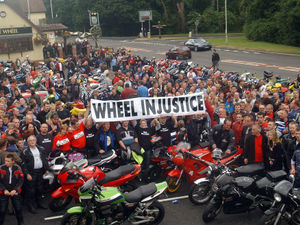Why there is hope for tighter laws on traveller camps
After what seems like an eternity, ministers are finally set to review the laws around illegal gipsy and traveller camps.
A consultation, announced by Communities Minister Alok Sharma, will examine whether current police powers are stringent enough to deal with the growing problem of unauthorised encampments.
It will also look at whether planning legislation is properly enforced against camps built by members of travelling communities.
In the West Midlands - a region that has been hit more than most by illegal encampments - the announcement will be come as a relief to many long suffering residents.
Illegal sites in the region more than doubled in the five years to 2016, and this year's figure is expected to be far higher.
MPs say that some travellers blatantly exploit laws designed to combat illegal camps, with the costs to local authorities and communities running into millions of pounds a year.
Mike Wood said the clean up bill in his Dudley South constituency has exceeded £150,000 over the last three summers, while the figure in Wolverhampton South East is up to £300,000 a year according to Pat McFadden.
This week's Commons debate on the issue was rare, in that as Walsall North's Conservative MP Eddie Hughes pointed out, there was broad agreement from both sides of the Chamber that something needs to change.
He said there had been 54 unauthorised encampments in Walsall up to September 26 this year - costing £190,000 to the council, without taking into consideration the cost of police and other support services.
"This summer has felt like a bizarre game of cat and mouse, as the council has chased pretty much the same group of travellers all around the authority," he said, before urging ministers to give the West Midlands Combined Authority greater powers to tackle the issue.
Mr Hughes also called for a Black Country wide injunction banning unauthorised camps.
Aldridge-Brownhills Conservative MP Wendy Morton welcomed the consultation, which she said would bring an end to the 'regular incursions' in her constituency that were making residents' lives a misery.
"I feel strongly that local councils need to work much more closely with the police and that the Government need to seek to understand—this is why the consultation is a starting point—whether existing legislation needs to be implemented more effectively, which would be a help, or strengthened," she said.
Currently police powers (under Section 61 and 62a of the Criminal Justice and Public Order Act, allow the removal of trespassers who cause criminal damage or engage in abusive and intimidating behaviour, or those who have six or more vehicles on the land.
Police can also seize and remove vehicles. Councils can apply for a court order to remove illegal camps, but this can take up to two weeks and incurs legal costs for the authority.
However, Labour's M McFadden said that present laws were 'not good enough'.
"It is too slow and too expensive, and the people who pay the cost are our constituents," he added.
"We need legal change to make the removal of illegal encampments faster and cheaper."
Mr McFadden added that there appeared to be 'little or no disincentive to setting up illegal encampments'.
"Those who do so know that there will be a delay before the council gets its court order, and they are rarely forced to pay for the costs arising from their dumped rubbish."
Ian Austin, the Labour MP for Dudley North, said parks and facilities in his constituency were being damaged by illegal encampments every summer.
"Some of the sites have been left with huge amounts of rubbish and waste. In some cases, unbelievably, human waste in children's play areas," he said.
"I think this is completely unacceptable and I want the police and the council to be able to deal with these sites much more quickly."
Conservative MP Mr Wood said part of the problem was the 'huge variation' across the country in how police powers were applied when dealing with illegal camps.
He has called for 'clearer guidance' on appropriate use of the powers that the Criminal Justice and Public Order Act, as well as reform of the law regarding moving travellers to transit camps.
However, Warley MP John Spellar accused many local authorities of failing to fully utilise existing powers to combat illegal camps.
He praised Sandwell Council for its creation of a traveller site and moves to take out court orders against individual families who persistently break the law.
"When such action is taken, the public will be reassured and will live in much better harmony with the majority of the [travelling] community who...are acting peacefully and lawfully," the Labour MP said.
"We must deal with these rogue elements."
Mr Sharma has agreed to meet West Midlands Police and Crime Commissioner David Jamieson to discuss the issue.





